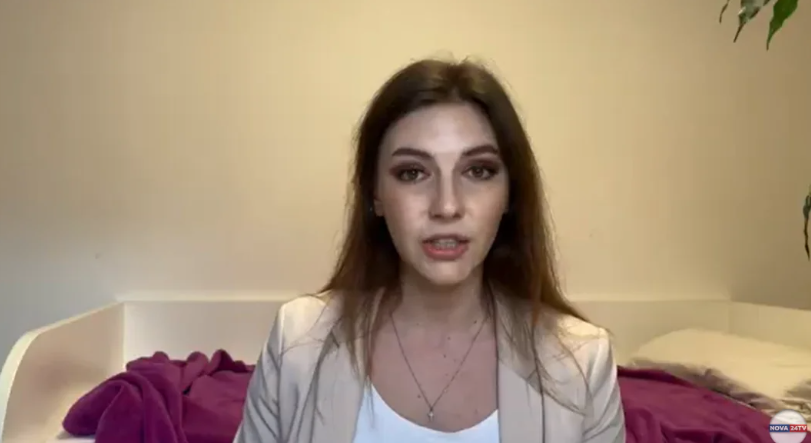In the shadow of the holidays, the government approved a draft amendment to the Media Law. The Minister of Culture Asta Vrečko says it is one of the most progressive laws in Europe, but there is a growing public opinion that the law could be a potential tool for the authorities to silence their political opponents.
“If they so decide, someone, some political commentator, who says something against the government, for example: taxes are too high, this government is not working, it is not working well, this government is lying – could be prosecuted under the law,” warned political influencer Zala Klopčič.
“This is a very important area of protection of freedom of speech, and until now, it was thought that the only criterion here could be the courts, that the law in our country is also relatively harsh and that people can be punished in the courts for their words. I find it really hard to understand why this needs to be expanded,” said Peter Jančič, editor of the Spletni časopis (Online Journal) media outlet, adding that he also finds the financial provisions controversial: “It is quite clear that the current government is already distributing money exclusively to the left-wing media, and practically nothing to the right-wing media.” According to Jančič, there are many more left-wing media outlets, but they are not in any way concerned with making the media space more plural – in fact, it is quite the opposite.
The long-time journalist, editor and political analyst agrees that the law is written through broad definitions, open to interpretation by an individual – in this case, a representative of the new inspectorate that is to be established at the Ministry of Culture. Jančič is outraged that in the future, inspectors would be ordering which articles should be withdrawn and even imposing fines.
And this applies not only to the media, but also to individuals
Political influencer Zala Klopčič says that it is the lack of transparency that is the problem, and that is why she has started a petition against political interference in social networks. “Nothing is clear, and if they are going to strictly implement this law, as I said, it can be very unfairly undemocratic, because they can then prosecute influencers as media. And if they decide to do that, someone, some political commentator, who says something against the government, for example: taxes are too high, this government is not working, it is not working well, this government is lying – could be prosecuted under the law,” she pointed out.
The lack of a definition of an influencer is another reason for the petition, which has so far gotten more than 11 thousand signatures, which, she argues, proves the thesis that the law creates more new ambiguities than solutions. “In which category do the politicians belong, where do political commentators belong? Where do athletes belong? For example, Tina Maze? Where does Borut Pahor belong, these are people who have some “influence”, but does that make them influencers? These are things that are very unclear,” Klopčič pointed out, adding that it should be the purpose of the law to make things clearer.
Jančič believes that the law is a threat to democracy under any government, as he believes that inspectors determining what does and does not belong in the media would be an abuse of political power.
The opinion in government circles is that any concerns about the dangers of the law are unfounded and its criticisms misleading, and that this is just more scaremongering of the public by the opposition. This view was reinforced by a social media post of the Left party (Levica), stating that the Slovenian Democratic Party (Slovenska demokratska stranka – SDS) was lying, while the Left’s Minister of Culture Asta Vrečko also criticised the petitioner, accusing her of manipulating the public. But the influencer responded that Vrečko is “telling lies”, adding that you don’t need legal knowledge to understand certain articles, you just need to “know how to read”. Klopčič hopes that the law will not be adopted, and Jančič also hopes that the coalition MPs will understand the danger and harmfulness of the law.
Tomašič: You journalists will be personally responsible for this
Boris Tomašič, a long-time media manager, is also appalled by the law. He believes that it puts further pressure on the work of journalists. “If this law is adopted, journalists will be personally responsible for the consequences of their work. You will be responsible not for mistakes, not for false information, not for, I don’t know, something you do that is illegal, but for the consequences of your work. Do you know what the consequences of journalistic work can be? For a government to fall? The consequence can be that somebody gets imprisoned. You will be directly responsible for that,” he warned.
“I hope they don’t make this law even worse in Parliament, because that can happen – the worst things are usually put in later with amendments. Because this coalition has a majority, they can get anything through, so we have to be careful in that sense, so that it doesn’t get worse.” The government says that this is one of the most modern media laws in Europe, which aims to guarantee citizens’ rights to full information and freedom of expression. But at the same time, the new form of control and restriction rightly raises concerns that the Freedom Movement (Gibanje Svoboda) coalition’s ship is sailing in the wrong direction.
Tanja Brkić


